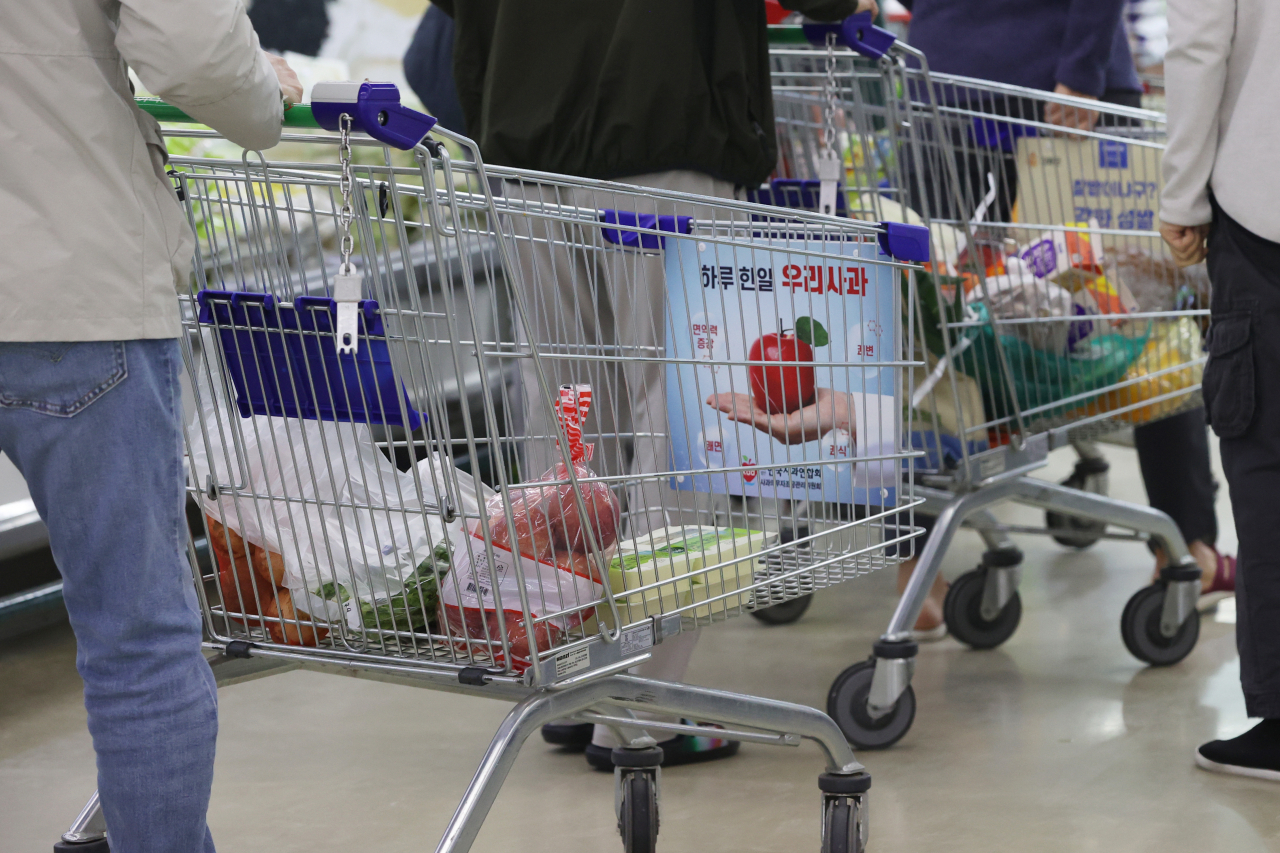S. Korean economy rebounds as consumer spending picks up
BOK expects declining growth amid weak exports
By Im Eun-byelPublished : April 25, 2023 - 15:30

South Korea’s economy showed a slight sign of recovery, with 0.3 percent growth in the first three months of 2023 on the rebound of private consumption as the COVID-19 pandemic wanes.
The country’s gross domestic product -- the value of all goods and services created -- grew 0.3 percent in the January-March period, showing signs of recovery from the minus 0.4 percent of the previous quarter. It showed a 0.8 percent increase from the same period of 2022, data from the Bank of Korea showed Tuesday.
An increase of private consumption, bolstered by eased pandemic restrictions, led the growth, the BOK assessed.
Private consumption rose by 0.5 percent, as expenditures on services including recreation, culture, restaurants and accommodations increased. The central bank explained that the eased indoor mask mandate paved the way for the increase in consumption.
Government consumption grew by 0.1 percent. Spending on social security benefits increased, but the figure was pulled down by a decrease in expenditures on goods.
Construction investment expanded by 0.2 percent, with increased building construction. Facilities investment fell by 4 percent, driven by decreased investment in machinery including semiconductors equipment as the chip industry remains slow, the BOK explained.
Exports expanded by 3.8 percent, with an increase in the exports of transportation equipment such as motor vehicles. Imports grew by 3.5 percent from the previous quarter, with increased imports of chemical products.
While private consumption contributed 0.3 percentage points to Korea's economic growth in the first quarter of this year, net exports knocked down growth by 0.1 percentage points, pulling the figure down for four consecutive quarters since April-June of 2022.
It is the first time since the 1998-99 period following the financial crisis for net exports to bring down GDP growth for four consecutive quarters.
For South Korea, a country heavily dependent on exports, the downward trend in exports income poses a risk for the economy.
With low exports, the Bank of Korea may pull down the projected growth rate for Korea, currently at 1.6 percent. The central bank had already lowered the figure by 0.1 percentage point in February from 1.7 percent, yet it expects a further dip.
The BOK initially expected the Korean economy to pick up this year as the country recovers from the pandemic and China reopens its economy, yet signs of recovery have been slower than expected.
“The uncertainty remains very high both internally and externally,” Shin Seung-cheol, director of the economic statistics department at the BOK, said during a press briefing Tuesday.
“It is highly likely that the growth rate for the year may have to be pulled down slightly, considering the recovery of the IT industry and the slowed effects of China’s reopening,” Shin said.
The BOK previously explained through a report that Korea’s chip industry and the larger economy will recover when the IT industry rebounds and China’s inventory in related products goes through adjustments, leading to higher demands for Korean goods in the second half of 2023.
The Monetary Policy Committee also mentioned that Korea’s growth rate may be further brought down, saying, “This year’s growth rate is likely to drop from the previous projection of 1.6 percent by a narrow range” on April 11.
The BOK's gloomy projection for this year is shared by other institutions. Earlier this month, the International Monetary Fund also pulled down Korea’s growth rate by 0.2 percentage point, from 1.7 percent to 1.5 percent, considering the slow recovery of the Korean economy earlier this year.
The Finance Ministry and the Organization for Economic Cooperation and Development both suggested 1.6 percent growth for 2023, while the Korea Development Institute said it deems the Korean economy to pick up by 1.8 percent this year.
“Uncertainty is high, but there will likely be ... a rebound in growth in the second half of 2023, as the slow IT industry recovers,” Shin said.







![[KH Explains] Hyundai's full hybrid edge to pay off amid slow transition to pure EVs](http://res.heraldm.com/phpwas/restmb_idxmake.php?idx=644&simg=/content/image/2024/04/18/20240418050645_0.jpg&u=20240419100350)







![[From the Scene] Monks, Buddhists hail return of remains of Buddhas](http://res.heraldm.com/phpwas/restmb_idxmake.php?idx=652&simg=/content/image/2024/04/19/20240419050617_0.jpg&u=20240419175937)

![[KH Explains] Hyundai's full hybrid edge to pay off amid slow transition to pure EVs](http://res.heraldm.com/phpwas/restmb_idxmake.php?idx=652&simg=/content/image/2024/04/18/20240418050645_0.jpg&u=20240419100350)

![[Today’s K-pop] Illit drops debut single remix](http://res.heraldm.com/phpwas/restmb_idxmake.php?idx=642&simg=/content/image/2024/04/19/20240419050612_0.jpg&u=)